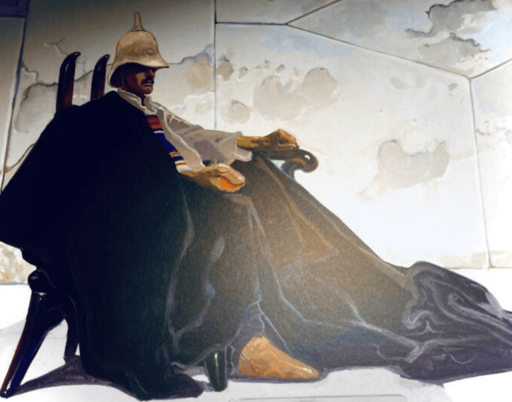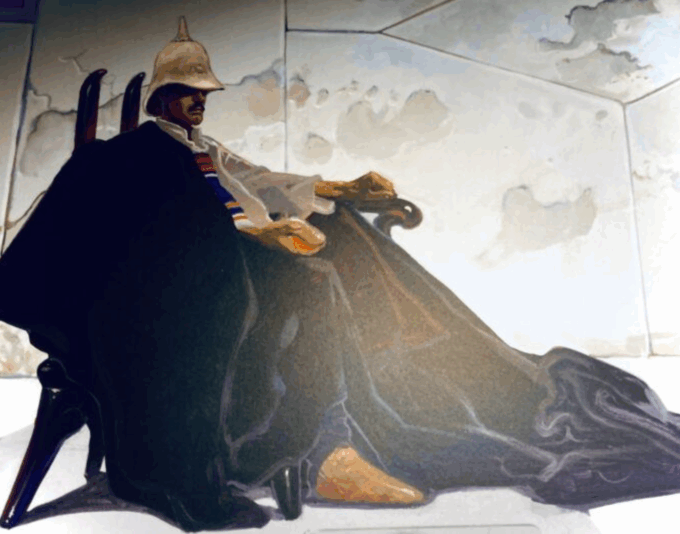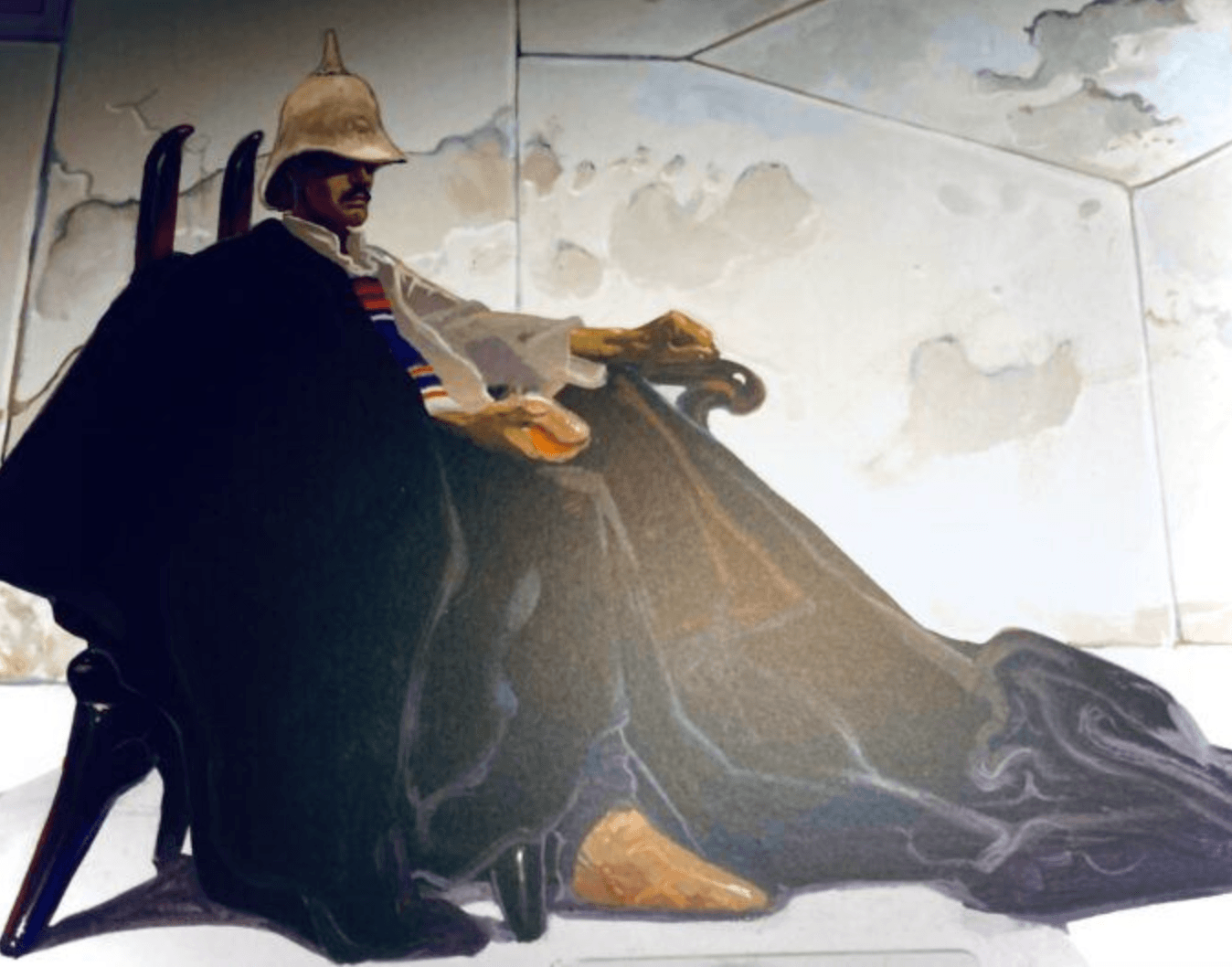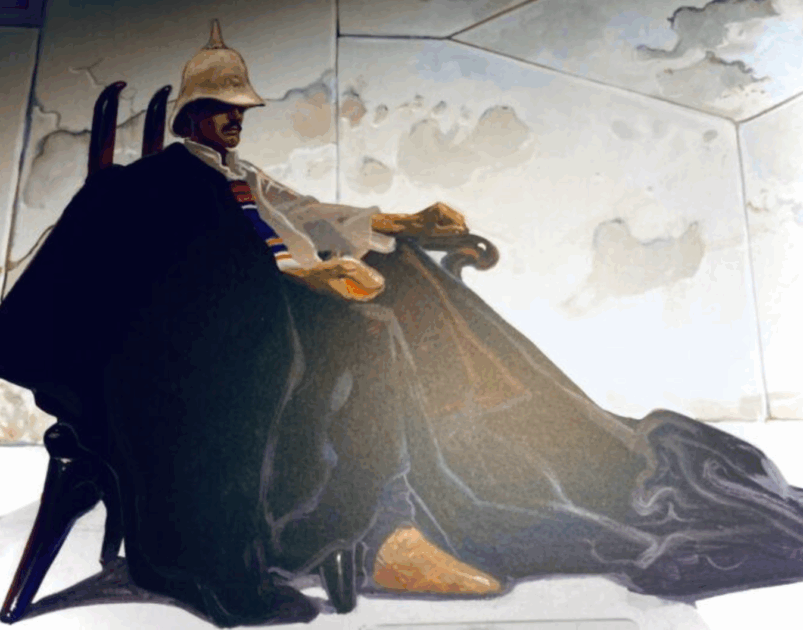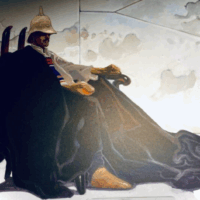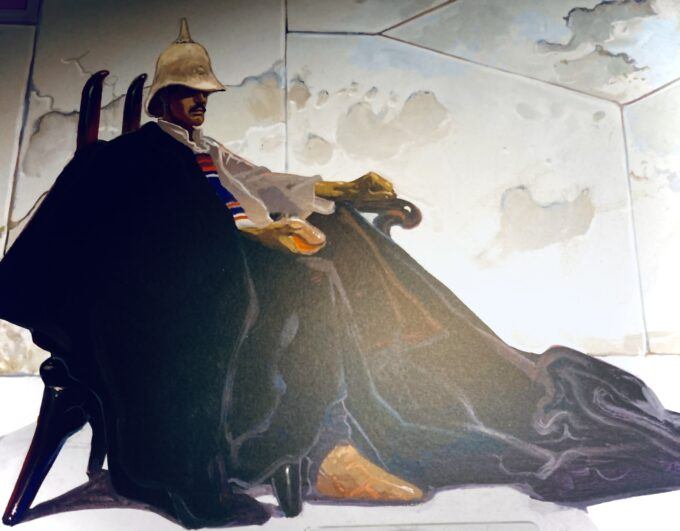Photo of a drawing by Magnus (pseudonym of Italian comic book artist Roberto Raviola) at Palazza del Fumetto Pordenone, Italy. Photo: Paul Cochrane.
Britain is no stranger to genocide. It has carried out many in the past, and today it is enabling another by being a willing participant in Israel’s genocidal war on the Palestinians. Britain wants to hide its crimes by concealing the truth about all the ways it’s helping Israel commit genocide: by sharing its airbases, its intelligence, and generous arms exports, and by providing political cover. It is also trying to silence any pro-Palestinian activism by deeming non-violent civil disobedience, as carried out by Palestine Action, as a terrorist act, with support for the group punishable by up to 14 years in prison.
This increasingly censorial and Draconian approach follows a well-thumbed textbook used by the British establishment to deny, downplay, spin or hide the country’s role in conflicts and occupations across the globe—both historically, and more recently, especially when acting as the USA’s wingman during the ‘War on Terror’ decades.
Britain’s decision to “stand shoulder to shoulder” with the US, as Prime Minister Tony Blair famously put it in 2001, at the start of the War on Terror, led to an immense toll on human life, with direct and indirect deaths estimated at 4.5–4.7 million people, according to Brown University’s Costs of War project.
Yet Britain’s warmongering and its contribution to this horrific death toll is not hammered home by the legacy media in the same way as Russia’s war on Ukraine or the Hamas-led 7 October 2023 attacks on Israel. By not doing so, the media is able to manufacture consent for Britain’s participation in the ‘Forever Wars’, and stifle any serious public debate about why the country has such a militaristic foreign policy. The media not exposing the UK’s bloody track record also allows prime ministers to get away unchallenged with rhetoric such as current leader Keir Starmer saying that “Britain is united, with Israel, against terror, for international law and the protection of innocent lives.”
It was a rare admission by Conservative Party leader Kemi Badenoch as to why Britain is standing shoulder to shoulder with the US and Israel when she blurted out: “Israel is fighting a proxy war on behalf of the UK, just like Ukraine is on behalf of western Europe against Russia.” The proxy war is to “eliminate Hamas” and deal a blow to Britain’s “enemy”, Iran.
Such justification is couched in language that British politicians regularly used throughout its imperial empire, and Benjamin Netanyahu has adopted: that Israel is waging a war of “civilization versus barbarism” and “between forces of light and forces of darkness, between humanity and animalism.”
The underlying rationale here is that the Palestinians are not part of Western civilization – and are therefore untermenschen, ‘unpeople’, not worthy of the same rights or equality; and the corollary is that any opposition against the ‘West’ by them should be, and can be, violently repressed.
Britain’s imperial administrators considered those they ruled, and those fighting for freedom in Britain’s colonies, as ‘unpeople’, such as the violent repression of the Kenyans and Malaysians.
This mindset continued despite the end of the Empire and the rise of the American Empire as London scrambled to retain some form of global influence by siding with Washington.
Since the end of World War II, British foreign policy contributed, directly and indirectly, to the ‘deaths of between 8.6-13.5 million people, or around 10 million, according to Mark Curtis, founder of Declassified UK, in his book Unpeople: Britain’s Secret Human Rights Abuses (2007). These figures do not, however, include the death toll from much of the War on Terror, with Curtis listing 10,000-55,000 killed in the 2003 invasion of Iraq, and 15,000 to 25,000 killed in the 2001 invasion of Afghanistan. Curtis lists British support for Israel from 2000 to 2007 being responsible for the ‘indirect deaths’ of 2,723.
To these figures should be added over 65,000 massacred in Gaza, possibly as high as 200,000, as research has indicated, and the Costs of War project figures for the War on Terror. Totaled up, Britain is directly and indirectly responsible for the deaths of around 15 million over the past 80 years.
A further 38 million excess deaths (around 564,258 a year) from 1971 to 2021 due to unilateral economic sanctions imposed by the US and the European Union (which includes the UK), according to a study published in The Lancet, could be added to the toll. That would bring the total death toll of Britain’s support for wars and economic sanctions to a staggering 53 million.
As Curtis wrote: “Britain bears significant responsibility for around 10 million deaths since 1945, including Nigerians, Indonesians, Arabians, Ugandans, Chileans, Vietnamese and many others. Often, the policies responsible are unknown to the public and remain unresearched by journalists and academics.”
There is a danger that, unless pressure is brought to expose the UK’s role in aiding and abetting genocide, and hold those responsible accountable, such atrocities will happen again and again. Britain’s role could also be forgotten about when the next war or crisis dominates the news, and the truth only known in decades to come when governmental archives are opened up (if, by then, there is still a Freedom of Information Act, and if key documents are not redacted for ‘national security reasons’). The USA will have taken most of the blame for bankrolling and supporting Israel’s brutality, with the UK’s role a mere footnote, as with so many Anglo-Saxon military ‘adventures’.
The amnesia around Britain’s crimes leaves no room for acknowledgment and culpability. Nor does it make space for a reckoning with the grisly truth. All of this silence erases our ability to understand why people resist and oppose invasions, occupations and Western hegemony.
In Iran, two nations in particular are considered troublemakers, the USA and Britain (warranting governmental minders for tourists from these countries, unlike other nationalities). This is typically attributed to the belligerent stance against the Islamic Republic since 1979, and the 1953 US and UK-backed coup against Mossadegh for nationalizing Iran’s oil and reinstating the Shah.
The reasons to dislike ‘perfidious Albion,’ however, go much further back – all the way to one of, if not the darkest chapter in Iranian history, one that was so devastating that British archives on the topic are reportedly still withheld from the public.
During Britain’s occupation of Iran in 1917-19, an estimated 8-10 million Iranians, roughly 40% of the population, died from famine. Dr Mohammad Gholi Majd attributes this staggering death toll to three things: Britain’s reallocation of food to the armed forces during World War I; Britain’s deliberate destruction of food supplies, so as to not let them fall into the hands of the Turkish enemy; and the deliberate policy to use land for cultivating cotton and opium as cash crops for export, rather than for growing food. It was Iran’s second devastating famine, with a third to follow, resulting in the loss of 25 million lives over a 75-year period, from 1869-1944. There are only two books on the topic, both by Majd, who drew from US archives and diaries, rather than British archives.
The Great Persian Famine and Britain’s perfidious role in it has been almost entirely forgotten. Other famines and atrocities during Britain’s empire have not been, but are nonetheless not given the attention they deserve, such as the Irish famine, which killed 2 million, and the Bengal famine in 1943 that killed some 3 million. Only in recent decades has more research unearthed the true cost of colonialism, such as Mike Davis’ Late Victorian Holocausts, although a full audit has yet to be carried out.
Research into genocides in Australia reveal the staggering impact on the indigenous population. In the province of Victoria for instance, “within twenty years of settlement, the Aboriginal population of Victoria declined by eighty percent. As the British spread over the whole continent, countless nations were extinguished”.
In India, between 1880 and 1920 – the height of the British Raj – there were 100-165 million excess deaths, while trillions of pounds were plundered from the sub-continent. Figures for the colonisation of much of Africa, North America and other parts of Asia mean Britain has a bloody legacy of hundreds of millions of excessive, unnecessary deaths (and this does not include the death tolls of the World Wars or the atomic bombings of Hiroshima and Nagasaki).
The victors write the history, and Britain has not had to reckon with its past. Its policies however do have lasting impact and repercussions, while the policies utilised during Britain’s imperial past are still in play. The Israelis are using ‘divide and rule’, land encroachment and dispossession, police harassment, cultural destruction, starvation and immense violence (among other policies) to achieve its colonial-settler ends.
There is also a historical arc from the genocides and colonial policies of the 19th century and earlier, to the first use of concentration camps by the British in South Africa, to Nazi Germany’s warmongering and the Holocaust. World War II was after all a war of imperialisms, brought to Europe’s shores rather than elsewhere – if Britain had an empire, why could not Germany? – with the non-Ayrans the untermenshen, as well as the non-whites of the world. Indeed, the war against the Palestinians is a continuum of that, and part of Britain’s legacy, as has been argued by the likes of Sven Lindqvist in his book Exterminate All the Brutes, and in Raoul Peck’s documentary series of the same title.
While history should not be forgotten – for how can we know how we got to where we are, and may be going? – the UK’s current actions and policies should be under intense scrutiny – and the government put under pressure – to stop the genocide in Gaza or risk Britain’s role being overlooked as in so many of its past atrocities, confined to the proverbial ‘dustbin of history’. Britain has for so long been on the ‘wrong side of history’, and if more people realised that, perhaps Britain would stand, finally, on the ‘right side of history’.
The post The Gaza Genocide: Another Massacre to Add to Britain’s List, With 15 Million Deaths Since 1945 appeared first on CounterPunch.org.
From CounterPunch.org via this RSS feed


